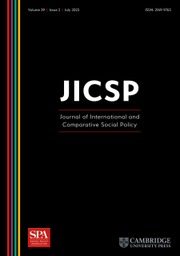No CrossRef data available.
Article contents
“Women without guardians” in Iran: gender, cultural assumptions, and social policy
Published online by Cambridge University Press: 09 March 2020
Abstract
This article explores the role of cultural assumptions in the formation of the only Iranian social programme designed exclusively for women, “Empowering Women without Guardians”. It examines these assumptions at different stages of the policy process: problem definition, policy formulation, and policy adoption. As shown, assumptions behind the adopted policy are not consistent with the ones underlying the original problem definition; women are considered mothers at the problem definition stage, but at the policy adoption stage they are understood as workers. The relative power of these assumptions helps explain both continuity and change in Iranian social policy towards women.
- Type
- Research Article
- Information
- Journal of International and Comparative Social Policy , Volume 29 , Issue 1 , February 2013 , pp. 48 - 63
- Copyright
- Copyright © 2013 Taylor & Francis




